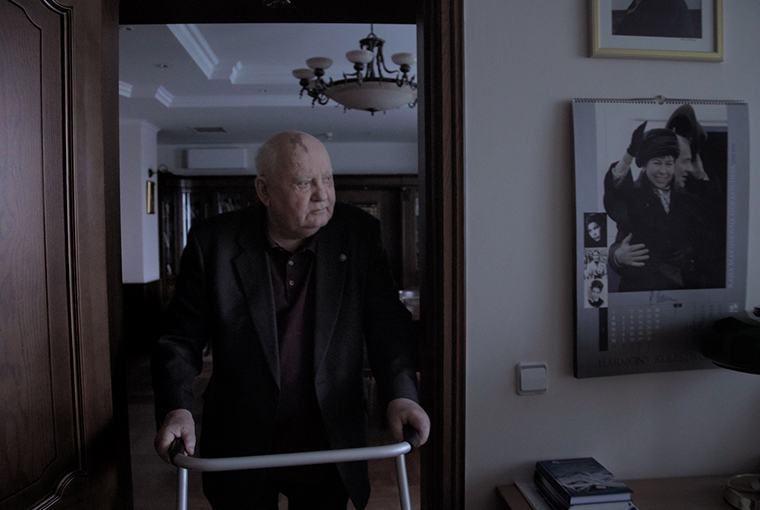Greeting Gorbachev
Vitaly Mansky’s Gorbachev. Heaven (2020)
Vol. 114 (April 2021) by Konstanty Kuzma
Gorbachev has a curious role in our understanding of recent history. Despite being a Soviet politician and an abiding adherent of Marxist-Leninist tradition, he is widely revered across the Western world. Conversely, Gorbachev is viewed skeptically by state media and government politicians in Russia. In both Russia and the West, this pronounced stance is almost exclusively due to the role that Gorbachev played in the fall of Communism. In Berlin, he is featured alongside George Bush Sr. and reunification chancellor Helmut Kohl in the “Fathers of Unity” monument that marked the 20th anniversary of German reunification. Whereas former Russian president Dmitry Medvedev has noted that “a great many Russians have the feeling that they lost their country back then, and they hold him responsible for this”.1 In short, how Gorbachev is viewed across Europe is closely linked to the way Soviet Communism is perceived. Meanwhile, Gorbachev’s vision of easing Western-Eastern tensions, and of reversing nuclear proliferation, is of no ideological use to either side today. Werner Herzog has tried to remind audiences of this conciliatory role through his 2018 conversations with Gorbachev, which formed the basis for his Meeting Gorbachev (co-directed alongside André Singer). Two years later, it is the former, revolutionary role that Vitaly Mansky addresses in his own interviews with Gorbachev for Gorbachev. Heaven.
Being an homage built around Werner Herzog’s personal gratitude towards the man himself, Meeting Gorbachev did not suffer from grave aesthetic inconsistencies. The film naively paints Gorbachev’s career from his meager beginnings to the high ranks of Soviet politics, a steep and obstinate rise which happens to match the way that Herzog likes to recount his own life story. To tell the man’s story, Herzog and co-director André Singer retrieved archive material, interviewed other politicians and diplomats, and even appear to have visited his hometown. According to Herzog and Singer, Gorbachev was a man driven by resolve and principles who singlehandedly decided to change the world by pacifying international relations. His rallying for change, for seeking closeness to citizens, and for ending elite thinking, are thus never portrayed in the light of the tested populist formulae which became so popular in post-Communist Eastern Europe (think of the rise of figures such as Alexander Lukashenka or Mikheil Saakashvili, which long predated the Trumpism of money-backed politicians such as Andrej Babiš or Bidzina Ivanishvili).2 Instead, every official policy proclaimed or recounted by Mikhail Gorbachev is taken at face value. True, Gorbachev’s hopes of an end to the Cold War never materialized. But this does not really affect Gorbachev’s ideal legacy, whose inner life and ideals are supposed to exist independently of the world around him. The sentimental epilogue suggests that the real tragedy of Gorbachev’s life is the early death of his wife. What ultimately happened in international relations is sad, but not his fault. As a phrase jokingly attributed to Hegel states, “so much worse for the world” that it does not adhere to Gorbachev’s principles.
In his Gorbachev. Heaven, Vitaly Mansky resists such a subjectivist stance. Though Gorbachev repeatedly unearths Mansky’s personal involvement by addressing him, rebuking him, or offering him tea, Mansky tries to separate his persona from his documentary by remaining off-screen. (As Mansky has revealed in interviews, Mansky already knew Gorbachev before making his film.) He is also more than ready to be insistent about political matters when Gorbachev tries to change the subject matter. Mansky and cinematographer Alexandra Ivanova take their time to film not only Gorbachev’s monologues, but also his surroundings and the cumbrous way he moves around within them. They also refrain from including archive material or other voices (save for members of a theater ensemble who are briefly seen preparing a play on Gorbachev), although Gorbachev recounts his career in great detail. In keeping with the observant style, only select title cards that contextualize historical figures such as Lenin and Stalin consistently intervene in the footage of Gorbachev and his office and estate. Though its title may suggest otherwise, Gorbachev. Heaven is thus more of an epitaph than a requiem, mostly succeeding in eluding sentimentalism.
Ironically, despite appearing to know Gorbachev quite well, Mansky is therefore much more reserved and “neutral” when dealing with the politician compared to Herzog, who expresses his feelings of guilt and gratitude vis-à-vis Gorbachev (in both cases he does so “as a German”). When Gorbachev resists addressing the death of peaceful protesters in the last days of the Soviet Union, Mansky forces him to reveal if it was really him who gave those orders. In this sense, Mansky appears to “have learned” from his experiences with Putin, whom he had followed for Russian television upon his rise to power without really challenging his self-portrayal. (He processed his remorse over this experience years later in Putin’s Witnesses).
But in another way, the premise of Mansky’s film prevents him from truly challenging Gorbachev. The issue Mansky faces is that like Meeting Gorbachev, his film is an homage, but unlike Meeting Gorbachev, it is an homage on terms that Gorbachev himself does not accept. Mansky is grateful towards Gorbachev for the end of (Eastern European) Communism, an event which Gorbachev is neither happy about, nor feels responsible for. And this is a problem insofar as Mansky is thereby forced to feed Herzog’s narrative of singlehanded change. In his voice-over, Mansky announces that finding out how Gorbachev came to decide to bring down Communism singlehandedly, was one of his chief interests in making his film. And while Gorbachev will be allowed to correct Mansky’s understanding of the goal he was thereby trying to achieve, he will not tanker with the myth of him making a singlehanded decision to change the world. Like Herzog, Mansky buys into the story of him envisioning a better future on principle, of rallying for change because he deemed it right, and of following through purely out of personal conviction. In Mansky’s narrative, Gorbachev really wanted that change, only that he remains oblivious to the fact that this change necessarily implies an end of Communism. Which is hardly a coincidence. For had Mansky challenged even the part of Gorbachev’s narrative about his wanting to bring about change purely out of conviction, the homage would have collapsed. For there would be nothing Gorbachev could be thanked for – had he intended neither the effects of change nor even the change itself, both would be merely contingent products of his personal ambitions.
This is a bigger problem for Mansky than it is for Herzog and Singer, because Mansky had promised to offer a critical assessment of Gorbachev, whereas Herzog and Singer make it clear that their take on Gorbachev is an expression of personal gratitude and thus highly prejudiced. In the end, both cinematic products are equally guilty of bolstering the myth of the great men of the 20th century whose ideals supposedly shaped the world, only that Mansky seems to be less aware of this dynamic than Herzog and Singer are. Does this make Herzog’s and Singer’s film “better” than Mansky’s? I do not think that aesthetic considerations should be forced into such simplistic declarations. What can be said is that Herzog and Singer successfully pursue their premise, but that their premise is quite naïve: to thank Gorbachev for wanting to end the arms race. (I too think that nuclear non-proliferation and an end to the Cold War are absolutely elementary, but is feeding the myth of self-important old men the right way of bringing about that change?) Mansky’s film has a more difficult premise: it tries to understand the mind of a politician. And as if this premise weren’t difficult enough, Mansky also wants to thank him for the fall of the Soviet Union. That both can be achieved in a single film is highly unlikely. In Mansky’s film, the result is an odd discrepancy in his bearing towards Gorbachev. After giving in to Gorbachev’s embellished self-portrayal for more than an hour, he suddenly starts questioning him when the topic changes to the fall of Communism and Putin’s reign. Was everything he said prior to that trustworthy? Is our only criterion of truth a sound positioning within the everlasting dichotomy between West and East? If so, Herzog’s attempt to revive Gorbachev’s rhetoric of thaw may indeed have been in vain.
References
- 1.SPIEGEL Interview with Russian President Dmitry Medvedev. Retrieved from https://www.spiegel.de/international/world/spiegel-interview-with-russian-president-dmitry-medvedev-oil-and-gas-is-our-drug-a-660114.html [Accessed on May 16 2021].
- 2.This may be due to the fact that Soviet politics (as well as Russia’s, or that of Europe’s own aristocratic past), is still viewed mechanistically in the West, so that each power transition is thought to be simply guaranteed by the state’s power monopoly, not involving catering to all sorts of interest groups.




What struck me in Minsky’s meditation on Gorbachev and his place in history, is the sense of Soviet leaders being, like Tolstoy’s Olympian view of Napoleon, mere flotsam and jetsam, tossed aloft by the unpredictable moods of history’s impersonal and oceanic forces. Gorbachev repeatedly finds himself, under the director’s insistent probing, entirely unable to address his hero status outside Russia, which is the same foreign perception that was to deny him a State Funeral.
An air of defeat and a sense of inescapable guilt hovers over his refusal to address the tragic dilemmas he failed in office to resolve. ‘We all make mistakes’ is his only concession to Minsky’s disappointed hero-worship. He even tells an anecdote about Stalin that presents that monster as only fallible, when excesses were perpetrated in his name. He also takes a tolerant view of Yeltsin, despite his admitted alcoholic follies, saying, ‘He was who he was.’ The reminiscences of his impoverished youth during Stalin’s Terror make light of the arbitrary cruelties of the time, as when telling of an Uncle’s arrest and torture on charges eventually dismissed as groundless: Upon his Uncle’s return to the family, it was seen that his hands had been smashed; the KGB had wantonly slammed a door on them. Gorbachev’s dismissive comment on this relative’s unjust fate emerges from the fatalistic heart of the Russian Serf, ‘What did he want with Trotskyism?’ he chuckles.
Yet Gorbachev had, instilled in him from his mother, the sentimental poetry and song of the Russian and Ukranian people, and he frequently breaks out into recitation and song during the film. Such humane traits are equally revealing of the individual as his callous ones. The Russia that produced Gorbachev did not create a Gandhi, but an affable and cultured individual who was ultimately incapable of breaking the wild and dangerous steed of Soviet Power to his political Will, and who actually lived to regret that he had not been more ruthless when in power. He says, ‘I failed’. He actually muses whether he should have cracked down more harshly on rebellions in the Soviet Empire or was unwise and weak in not destroying Yeltsin. It was in fact Yeltsin who turned decisively against Communism, while Gorbachev insists to Mansky that he himself wanted to rebuild a reformed Soviet Union. He is indeed a loyal Marxist-Leninist, chiding Mansky for asking why he has not bought the house he is being filmed in, saying that he was granted this state dacha only for his lifetime, ‘- – – and that is right’. Evidently, he still approved of the Marxist tenet that ‘All property is theft’.
Only in the individualist West can Gorbachev be seen as some kind of hero for his espousal of the moderate reforming doctrines of Glasnost and Perestroika; in Russia he is largely seen as a failure and a leader weak to the point of betraying his People because of those reforms, and this despite having also striven to be the capably ruthless dictator necessary to rule Soviet Russia and it’s Empire: Under his rule, as we know, the Chernobyl nuclear facility exploded, after military experiments were approved, and this disaster was concealed; citizens demanding independence in the Baltic states died; soldiers wielding shovels brutally suppressed protesters in Tbilisi; Soviet tanks killed peaceful demonstrators in Baku. Yet the old Gorbachev fears he should have been even more implacable!
I think this film reveals that Gorbachev himself shares that profoundly Russian and collective view of the necessities of power. He is seen here, in his powerless, sentimental and ironic old age, as the last representative of that totalitarian System he once Presided over, only to see its destruction, and his own fall from power. We watch this tottering colossus, overweight and with mobility problems, crumbling before our eyes, like his dreams, as he sedulously avoids addressing Mensky’s attempt to confront Putin’s ruthless irridentism and Tsarist pretensions.
Gorbachev is that tragic and irreconcilable Chekhovian rift that exists between East and West, and that is a wound running deep into the Russian Soul. His life has little that can serve as a useful example to his deluded Western admirers. He remains just another chilly monument to Russian exceptionalism. The symbolism of the snow-capped monuments to forgotten Soviet apparatchiki, in the graveyard where he goes, near the film’s end, to visit his beloved wife Raisa’s resting place, is a powerful summation of the hermetic and alien spiritual world he was part of.
A gnomic oracle of an alien and vanished world, Gorbachev is beyond any easy Western understanding. The lyrics he tenderly sings several times during this film, of the Russian river that, after freezing over, will thaw and see the Spring once more, while the life of man must freeze forever, and ‘cannot come again’, reveals his fatalistic acceptance of the oblivion he sees overtaking his memory. That humility, at least, is worthy of our respect and awe. But there remains only one, impersonal, monument here: The vast and unchanging face of Russia, blank and featureless as the snow.
The Moon face of a sick old man gazes silently down on the shroud of memory, where all the bodies lie